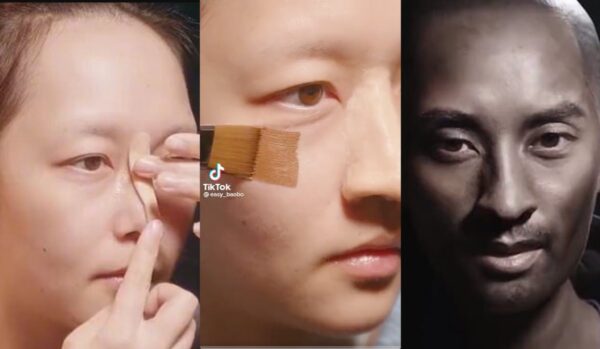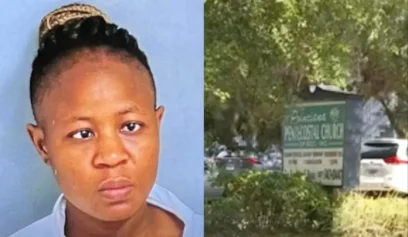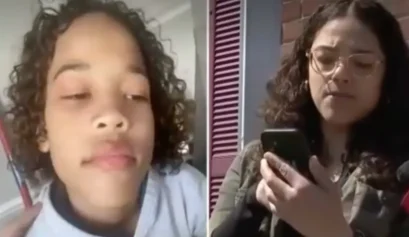An Asian makeup artist who makes videos transforming herself into various American celebrities is under fire after using her art to look like 18-time NBA All-Star Kobe Bryant.
The year-old video has resurfaced on social media, sparking a discussion on artistic license and minstrel mockery.

Many on social media are blasting her painting skills, saying she is performing “blackface,” and there is no place for that in this day and time.
The artist, whose TikTok name is @Easy_BaoBo, posted a video on the social media platform on May 27, 2022, of her painting herself as the Hall of Fame shooting guard, who died at 41 in a helicopter crash in January 2020.
To date, the post has received 182.3K views and hundreds of comments, with many people having mixed responses to the original video.
Easy Bao Bo’s look was achieved by using prosthetics to create the Los Angeles Lakers legend’s African features and brown paint to obtain his rich mocha skin. She also used sponges and black paint to create his signature eyebrows, mustache, beard, and close haircut.
While multiple comments celebrated how talented she is, many were aghast, saying variations of “That’s not allowed… I don’t think,” “Swear they banned that a while ago,” or “Don’t know how to feel about this.”
The backlash was so overwhelming the artist posted another video of her painted as Kobe with the caption, “Kobe is forever in my heart #fyp #foryou #foryoupage #kobebryant24 limitation makeup not imitating people just respect.”
In the 9-second clip, shared two days later, she morphs from being a medium-haired Asian woman with glasses to the five-time NBA champion.
@easy_baobo Kobe is forever in my heart #fyp #foryou #foryoupage #kobebryant24 ♬ original sound – easy_baobo
People continued to be wowed by her talent, but more asked why she would post a second time, and said the offense is still outrageous even with her tribute.
The video has made its way to Twitter. The reactions on that platform are far more explosive, with some alleging the woman is doing this for promotion and attention.
“What people are missing from the lady doing blackface today is that she did it purposely to get this reaction and her tiktok tag out and trending this broadly,” Kit Marks tweeted.
“When you see something this blatant, it is almost ALWAYS for clout. It’s racist, obviously. But it’s racism for clout.”
Another person wrote, “This is blackface. Whether the intention is cruel or not, she is benefitting from Black suffrage. She is using Black pain as an art form that does not come from her culture. And making money whilst so….this got them the clout they were looking for.”
Not everyone was offended by the makeup artist’s tribute and rejected the notion that she was performing in blackface.
“Blackface always had the intention to insult or ridicule Black people. Definitely not the case here,” one person wrote on Twitter.
Twitter user @catzombieface commented on the blackface allegation, saying, “No, it isn’t. Blackface was meant to mock black people. This is just art.”
There is a history behind blackface that is rooted in racism and intentionality, according to the Smithsonian’s National Museum of African American History & Culture.
Dating back to the 1830s, while America was still steeped in the shame of slavery, the first minstrel shows were performed in New York. White performers used burnt cork or shoe polish to blacken their faces as they gave performances that mocked or imitated what they believed the characters of enslaved Africans on Southern plantations must have been like.
“These performances characterized Blacks as lazy, ignorant, superstitious, hypersexual, and prone to thievery and cowardice,” the museum explains, noting a man named Thomas Dartmouth Rice, as the “Father of Minstrelsy,” as the first to popularize the blackface character Jim Crow.
The institution asserts, like many on social media, blackface continues to be popular in 2023 for those who intend to make fun of Black people.
“Those facing scrutiny for blackface performances insist no malice or racial hatred was intended,” the museum states.
This is true for a recent incident with Bartlesville pastor Sherman Jaquess, a white man, who said he was paying tribute to Ray Charles when he painted his body in black smudge and wore a Jheri curl wig during a 2017 Valentine’s Day performance.
In April 2023, a video resurfaced of the Oklahoma pastor dressed in blackface at the church’s costume party.
Unlike the TikToker, who created a spot-on replica of Bryant, Jacquess’ character looked nothing like the light-brown-skinned Charles, who wore his hair for most of his career in a military-styled crew cut.
There are also times people get it all wrong.
In 2020, an overzealous advocate for diversity, equity, and inclusion (DEI) called out the Scottsdale Unified school district PTA group for hiring a man who they say performed as a DJ in blackface during its recent charity event.
The two DEI representatives, one white woman, and one Black man, contacted the school’s principal and other administrations — sparking outrage on social media about what they believed was a racist act.
However, the person they believed was in blackface was actually an African-American.


